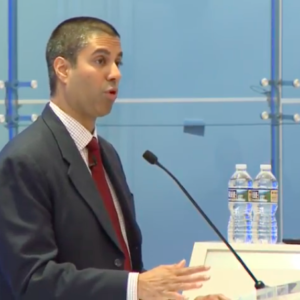When President Obama nominated Ajit Pai to the Federal Communications Commission in 2011, the White House detailed Pai’s impressive resume. Harvard. The University of Chicago. Prestigious work as a telecommunications lawyer in both the private and the public sectors. When Pai was confirmed unanimously by the U.S. Senate in 2012, it was no surprise.
Pai also impressed newly elected President Trump, who elevated him to the chairmanship of the FCC. In his short tenure as chairman, Pai has taken on some tremendous challenges, the first being a goal that has eluded politicians and FCC chairmen of both parties — closing the nation’s digital divide.
It bothers Pai — a lot — that millions of Americans still do not have access to broadband Internet service. Consider how much of the day you spend connected to the Internet, then imagine having to connect with a 1990s-style dial-up modem. People still do that in some parts of the country, if they are lucky enough to have service at all.
Life without broadband service means life disconnected from the broader global economy. Increasingly, it is an isolated life, one separated from the opportunities that most Americans take for granted.
The divide is especially large in rural America. Broadband access is nearly universal (97 percent) in urban areas. But 35 percent of rural Americans lack access to broadband service. Closing that divide isn’t a cure-all for rural America’s ills, but it will provide life-changing economic opportunities. It will make it easier for rural kids to access online education courses, rural parents to find better jobs, rural entrepreneurs and small businesses to grow and in turn create more opportunities for their neighbors.
Chairman Pai is rightfully focused on connecting the disconnected parts of the U.S., and he’s made it a top goal of his chairmanship. Though he sees federal and state money as appropriate for expanding access (his first vote as chairman was to approve $170 million to expand broadband service in upstate New York), he thinks the private sector can do the job better with the right incentives, such as creating enterprise zones to encourage investment in rural areas. This is the right approach to spur investment, connect more Americans and create good paying jobs.
Innovation is a word he uses a lot. If the FCC can facilitate private-sector innovation, the market will create solutions that no government official ever would think of devising. This thinking is already paying off. One of the first initiatives of his chairmanship was to approve phones that can transmit cellular data over local wi-fi networks, helping to ease traffic and increase speeds.
Pai is smart, capable, creative, and collaborative. He strives to work together to find solutions instead of dictating them. And he notably does not think of himself as someone who represents the government. When addressing an individual or a crowded room, he says — sincerely and often — that he represents the people. Their interests are paramount.
That commitment was obvious in one of his first acts as chairman, when he moved to make the FCC more transparent and accessible to the public by publishing the meeting agendas three weeks before each meeting. Amazingly, that had not been done before.
You would think that a public servant like this would earn another unanimous confirmation by the Senate. But Washington unfortunately doesn’t work that way these days.
His opponents are citing Pai’s opposition to Title II regulation under the Communications Act of 1934 as a reason for their opposition. But notably, they’ve twisted the facts, claiming he’s an opponent of “net neutrality” which is the principle dictating a free and open internet. Politics again. Very few people are against “net neutrality,” including Chairman Pai. The issue here is the application of 1930s command-and-control regulations, known as Title II, that allows the government to exert absolute control over ISPs to fix a theoretical problem that never existed — so-called “slow lanes.”
I wrote about the consequences of Title II in August. Prior to these heavy-handed regulations implemented in 2015, entrepreneurs invested freely in technologies that gave us the Internet as we know it and all of the economic opportunities that have come with it. Chairman Pai points out that in the first two years under the Obama FCC’s net neutrality regulations, domestic broadband capital expenditures fell by $3.6 billion among America’s 12 largest ISPs. It was the first time we saw a decline like that happen without a recession to cause it, and it disproportionately affected small business owners in the broadband space including minority-owned ones like mine, Actiontec.
America needs an FCC chairman who understands how the free market unleashes the creativity and investment that generates economic progress. It needs an FCC chairman who will use that creativity, not government commands, to bring new opportunities to rural America and foster the technological advances that will create new communications solutions no one has thought of yet. And it needs an FCC chairman who understands that he serves the American people and no one else.
Ajit Pai is that guy. The Senate should confirm him swiftly and cheerfully.

